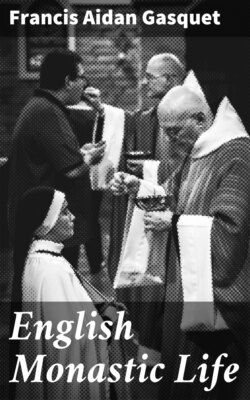Читать книгу English Monastic Life - Francis Aidan Gasquet - Страница 14
На сайте Литреса книга снята с продажи.
7. THE INFIRMARY
ОглавлениеTable of Contents
In the disposition of the parts of the religious house no fixed locality was apparently assigned by rule or custom to the infirmary, or house for the sick and aged. Usually it appears to have been to the east of the dormitory; but there were undoubtedly numerous exceptions. At Worcester it faced the west front of the church, and at Durham and Rochester apparently it joined it; whilst at Norwich and Gloucester it was in a position parallel to the refectory. Adjoining the infirmary was sometimes the herbarium, or garden for herbs; and occasionally, as at Westminster, Gloucester, and Canterbury, this was surrounded by little cloisters. The main hall, or large room, of the infirmary often included a chapel at the easternmost point, where the sick could say their Hours and other Offices when able to do so, and where the infirmarian could say Mass for those under his charge. According to the constitutions of all religious bodies the care of the sick was enjoined upon the superior of every religious house as one of his most important duties.
“Before all things, and above all things,” says St. Benedict in his Rule, “special care must be taken of the sick, so that they be served in very deed, as Christ Himself, for He saith: ‘I was sick, and ye visited me’; and, ‘What ye did to one of these My least Brethren, ye did to Me.’”
On this principle not only was a special official appointed in every monastery, whose first duty it was to look to the care and comfort of those who were infirm and sick, but the officials of the house generally were charged with seeing that they were supplied with what was needed for their comfort and cure. Above all, says the great legislator, “let the abbot take special care they be not neglected,” that they have what they require at the hands of the cellarer, and that the attendants do not neglect them, “because,” he adds, “whatever is done amiss by his disciples is imputed to him.” For this reason, at stated times, as for instance immediately after the midday meal, the superior, who had presided in the common refectory, was charged to visit the sick brethren in the infirmary, in order to be sure that they had been served properly and in no ways neglected.
